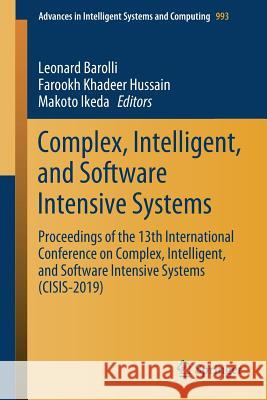Complex, Intelligent, and Software Intensive Systems: Proceedings of the 13th International Conference on Complex, Intelligent, and Software Intensive » książka
topmenu
Complex, Intelligent, and Software Intensive Systems: Proceedings of the 13th International Conference on Complex, Intelligent, and Software Intensive
ISBN-13: 9783030223533 / Angielski / Miękka / 2019 / 994 str.
Complex, Intelligent, and Software Intensive Systems: Proceedings of the 13th International Conference on Complex, Intelligent, and Software Intensive
ISBN-13: 9783030223533 / Angielski / Miękka / 2019 / 994 str.
cena 806,99
(netto: 768,56 VAT: 5%)
Najniższa cena z 30 dni: 771,08
(netto: 768,56 VAT: 5%)
Najniższa cena z 30 dni: 771,08
Termin realizacji zamówienia:
ok. 16-18 dni roboczych.
ok. 16-18 dni roboczych.
Darmowa dostawa!
Kategorie:
Kategorie BISAC:
Wydawca:
Springer
Seria wydawnicza:
Język:
Angielski
ISBN-13:
9783030223533
Rok wydania:
2019
Wydanie:
2020
Numer serii:
000453356
Ilość stron:
994
Waga:
1.42 kg
Wymiary:
23.39 x 15.6 x 5.21
Oprawa:
Miękka
Wolumenów:
01
Dodatkowe informacje:
Wydanie ilustrowane











